Frederick "Toots" Hibbert (1942-2020)
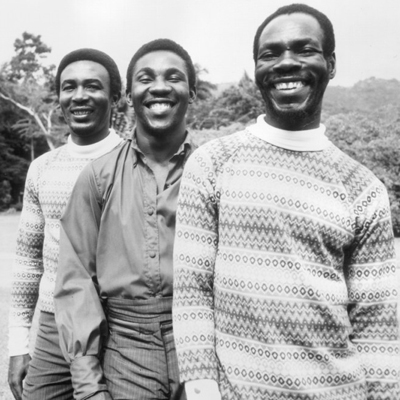
Toots & the Maytals, 1970 w/Toots in the middle
Tribute by Eric Doumerc
Live photos and live videos by Jason Gross
(December 2020)
The Maytals were one of the best vocal trios to emerge just before Jamaican Independence, in 1961, when Frederick "Toots" Hibbert, Henry Raleigh Gordon, and Nathaniel Jerry Mathias decided to join hands and form a group. Toots had come from the country to Kingston in the late 1950's to work in a barber shop. While cutting hair, he would also sing, which attracted customers who encouraged him to go and record his voice. He then met Raleigh Gordon and Jerry Mathias. Raleigh Gordon suggested "Maytals" as a suitable name for the group.
Toots had sung at Seventh Day Adventist services with his brothers and sisters, and some of the songs the trio recorded for Clement Coxsone Dodd, their first producer, are reminiscent of religious hymns of the kind to be found in the Sankey Hymnal, widely used by many churches at the time. The first tune they recorded for Coxsone is entitled "Hallelujah" (1961) and can be described as a religious hymn adapted to the ska beat. The energy deployed on that track was phenomenal and meant that the trio was successful. The group's "Sixth and Seventh Books of Moses" was more or less in the same vein, but referenced two books associated with Obeah and occult practices and not officially recognised by the traditional churches. The Pentecostal churches and the Pocomania cult did recognise these books as important though, and Toots may have been influenced by his family's religious practices. Indeed, his father was a preacher and his mother was also a regular church-goer.
The Maytals recorded many outstanding tunes for Coxsone like "I'll Never Grow Old" with its driving rhythm and amazing vocal performance. Indeed, it is often said that the Maytals had to have some superior vocal ability to hold their own against the relentless accompaniment on many ska records.
the Maytals also recorded the spiritual "He Will Provide" for Studio One as well as many other songs like "Marching On," "Matthew Mark" and "Shining Light," but by 1963, they decided to try their luck with other producers, like Deanne Daley ("Come Into My Parlour"), Vincent Chin ("John and James") and Leslie Kong ("Neither Silver Nor Gold"). But it was with Prince Buster that they recorded a new series of hits like "Judgement Day," "Pain In My Belly" and "Broadway Jungle" (aka "Dog War"). "Broadway Jungle" is an outstanding track by any standards with its relentless ska rhythm, its great vocal performance from Toots and the yelps from the back-up singers. Apparently the song celebrated the group's departure from the Coxsone stable (they were saying that they were finally out of the jungle and moving on to Broadway) as they felt that Dodd was treating them "shabbily" (Katz, 55). Unfortunately, Prince Buster did not treat them better.
In 1966, the Maytals won the first Festival Song Competition with their hit "Bam Bam," which Toots later recut for the soundtrack to the film Countryman, but 1966 was also the year when Toots was incarcerated for 18 months for possession of marijuana. This considerably slowed down the group's career, but they came back with a vengeance in 1968 on Toots' release with what was to become one of the group's best-known hits: "54-46 Was My Number," titled after Toots' prison number in jail. 1968 also saw the release of "Do The Reggay," a song that celabrated the new dance then doing the rounds of sound systems after rock steady (which faded away after 1968). This 45 is supposed to be the first vinyl record on which the word "reggae" (originally spelt with a "y") appeared.
The late 1960's and early 1970's were an extremely productive period for the Maytals as they recorded an amazing number of hits like "Monkey Man" and "Pressure Drop". The producer Leslie Kong released two albums by the Maytals, From The Roots (1970) and Monkey Man (1971), which sold very well in England and proved to be very popular with the skinheads.
In 1969, they won the Festival Song Competition again with "Sweet and Dandy," which together with "Pressure Drop", was picked up by Island Records for inclusion on the soundtrack to the film The Harder They Come (1972). This film had a massive impact in Jamaica and abroad (see the article on The Harder They Come in a previous issue of Perfect Sound Forever) and boosted the group's career abroad, giving them some visibility as they can be seen recording "Sweet and Dandy" in a studio in one of the film's key scenes.
After Leslie Kong died in 1971, the Maytals began to work with the producer Byron Lee and recorded the album Slatyam Stoot for him, which came out in 1972. That same year, the group won the Festival Song Competition again with the song "Pomp And Pride."
The album entitled In The Dark (1974) featured a beautiful cover of John Denver's "Take Me Home Country Roads" and was the last album the band recorded for Warwick Lyn and Byron Lee. Indeed their next two albums, Funky Kingston and Reggae Got Soul, were recorded for Island Records. The Reggae Got Soul album had a huge impact in Britain and in the USA, and made reggae popular with a new audience in these countries.
1979 saw the release of the Pass The Pipe LP, which contained beautiful and soulful tracks like "Inside, Outside", "Famine" and a song entitled "No Difference Here" which gave the album its title ("Pass the pipe on the right-hand side").
In 1980, Toots released two albums: Toots Live, an album recorded at the Hammersmith Palais, London, and which was mixed, mastered and packaged in 24 hours, and Just Like That. The Just Like That album featured the catchy and bouncy "Chatty Chatty," but also the great soulful title-track and gospel-influenced tunes like "Journeyman" and "Israel Children."
In 1981, the original Maytals released their final album together, Knock Out, which featured Toots on the cover posing as a boxer. The album featured outstanding tracks like "Careless Ethiopians," "Never Get Weary" and "Beautiful Woman," and led to more touring.
After the release of Knock Out, Toots continued touring as a solo act, appeared at Reggae Sunsplash 1982 (see the album Live At Reggae Sunsplash), and went back to this roots in 1988 with the album Toots in Memphis on which he revisited so many of the soul and R'n'B hits which had inspired his music over the previous twenty years. The album contains amazing versions of "Knock On Wood," "Dreams To Remember" and "Too Hot To Handle" to name just a few. Fittingly, the album won a Grammy nomination.
The 1990's saw Toots continue to tour and appear at the Reggae Sunsplash festival again. He released the Recoupalbum in 1997 and the Ska Father LP in 1998. By then, he was performing all over the world as a living legend of reggae.
Toots and the Maytals' music successfully combined soul music, R&B and reggae, and made the continuity between these musical forms visible. His songs "Reggae Got Soul" and "Funky Kingston" made that obvious and proved it musically, but his whole career can be seen as a testament to that reality. In their seminal book Reggae Bloodlines, Stephen Davis and Peter Simon described a Toots and the Maytals concert as "part revivalism, part reggae funk, part 1967 Memphis soul review" (Davis and Simon, 90). Toots' main influences as a vocalist included Otis Redding and Sam Cooke, and this shows in his vocal style. The R&B and soul roots of his music can explain his early success in the USA where the Maytals toured a lot in the 1970's. But his music was also probably broader than that: after all, one of his biggest hits was a cover of John Denver's "Take Me Home, Country Roads." Toots' version is more than just a cover version: he made that song his own. On the Reggae Got Soul album, there is a cover of Van Morrison's "I Shall Sing" and once again Toots ended up owning that song. And of course, the Maytals' version of Richard Berry's "Louie Louie" (on the Funky Kingston album) is considered one of the best covers of that legendary tune.
Most of all, Toots was also a great songwriter steeped in the blues oral tradition and he is probably one of the few reggae artists to have had a song selected for a major poetry anthology. Indeed his song "Never Get Weary" (from the Knock Out album) can be found in Paula Burnett's Penguin Book of Caribbean Verse (1986) as an example of the Caribbean oral tradition. In 2005, Toots released True Love, an album which contained many classics originally recorded by the original trio and which were now re-recorded with guest artists like Bunny Wailer, Ken Boothe, Bonnie Raitt, Ben Harper, and Eric Clapton. This won Toots a Grammy Award for Best Reggae Album.
Toots released a final album entitled Got To Be Tough in 2020 and was looking forward to touring to support it, but this was not to be as he passed away on 11 September 2020 at the hospital of the University of the West Indies, following respiratory problems linked with COVID-19.
References:
- Burnett, Paula. The Penguin Book of Caribbean Verse in English. London: Penguin, 1986.
- Davis, Stephen and Peter Simon. Reggae Bloodlines : In Search of the Music and Culture of Jamaica. 1977. New York : Da Capo Press, 1992.
- Katz, David. Solid Foundation : An Oral History of Reggae. London: Bloomsbury, 2003
- Mason, Peter. "Toots Hibbert obituary," The Guardian, 12 September 2020.
- Thompson, Dave. Reggae and Caribbean Music. San Francisco: Backbeat Books, 2002.
BONUS
On July 1, 2016, Toots did a private promo appearance in NYC where he did a brief solo set of his hits. We're proud to share some previously unseen photos and videos from the event below.
| Photos by Jason Gross, © 2020 | |
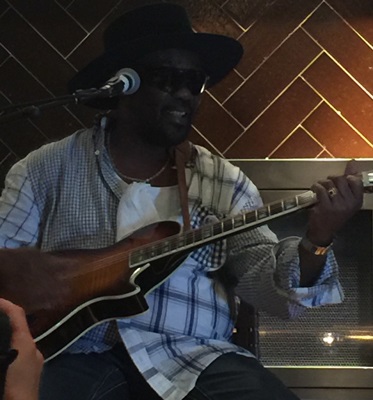 |
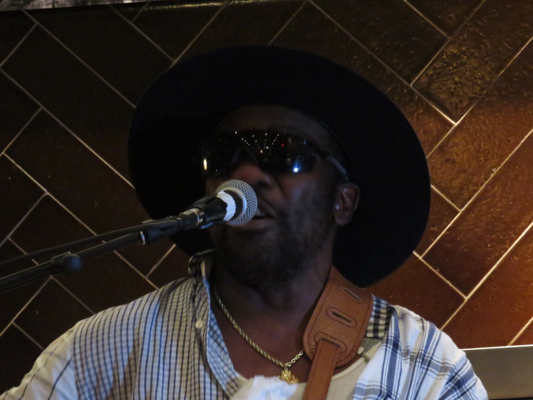 |
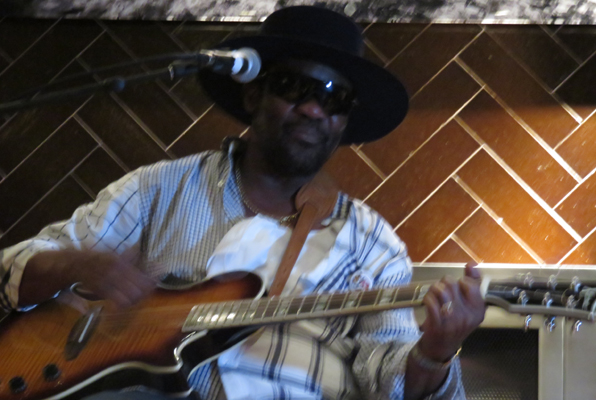 |
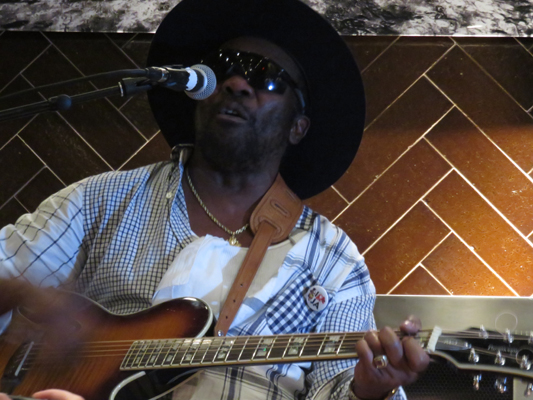 |